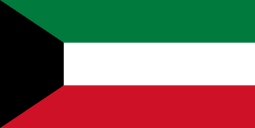Emir of Kuwait
The Emir of the State of Kuwait is the monarch and head of state of Kuwait. It is the most powerful position in the country. The emirs of Kuwait are members of the Al-Sabah dynasty, which originate from the Bani Utbah; a federation of clans in the Arabian Peninsula.
| Emir of Kuwait | |
|---|---|
| أمير الكويت | |
 | |
| Incumbent | |
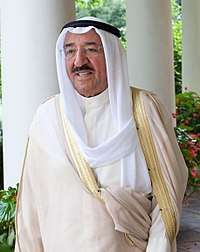 | |
| Sabah Al-Sabah since 29 January 2006 | |
| Details | |
| Style | His Highness |
| Heir apparent | The Crown Prince Nawaf Al-Sabah |
| First monarch | Sabah I bin Jaber |
| Formation | 1752 |
| Residence | Bayan Palace |
 |
|---|
| This article is part of a series on the politics and government of Kuwait |
|
|
|
Constitution |
|
|
Ruling family
|
|
|
|
Related topics
|
|
|
Since 29 January 2006, Sabah Al-Ahmad Al-Jaber Al-Sabah is the current emir.
Rules and traditions of succession
Succession to the throne of Kuwait is limited to the descendants of Mubarak Al-Sabah. The position of Emir is also traditionally alternated between the two main branches of the Al-Sabah family, the Al-Ahmed and Al-Salem branches. The reigning emir must appoint an heir apparent within one year of his accession to the throne; the nominee for consideration as Crown Prince has to be a senior member of the Al-Sabah family. The nomination needs approval by an absolute majority of members of the National Assembly, Kuwait's parliament. If the nominee fails to win approval from the National Assembly, the Emir submits the names of three eligible members of the family to the National Assembly, and the National Assembly selects one to be the crown prince.
The Prime Minister is appointed by the Emir; however the appointment of the prime minister requires approval from the majority of members of the National Assembly.
Compensation
Annual compensation for the Emir is defined by the National Assembly. The annual compensation is currently set to 50 million KWD.[1]
The role of the National Assembly
The National Assembly (per article 4 of the Constitution) has the constitutional right to approve and disapprove of an Emir's appointment, therefore the National Assembly has the authority to remove an Emir from his post. The National Assembly effectively removed Saad al-Sabah from his post in 2006 because of Saad's inability to rule due to illness. Kuwait's National Assembly is the most independent parliament in the Arab world,[2] it ranks highly in comparison to other parliaments in the Middle East as a whole.[3]
Emirs of Kuwait (1752–present)
| No. | Name (Birth–Death) |
Portrait | Title(s) | Reigned from | Reigned until |
|---|---|---|---|---|---|
| 1 | Sabah I bin Jaber (Sabah I) (1700–1762) |
 |
His Highness The 1st Ruler of Kuwait |
1752 | 1762 |
| According to the official Kuwaiti sources, Sabah I was unanimously chosen for the position of sheikh.[4] | |||||
| 2 | Abdullah I Al-Sabah (Abdullah I) (1740–1814) |
 |
His Highness The 2nd Ruler of Kuwait |
1763 | 3 May 1814 |
| Youngest son of Sabah I bin Jaber. | |||||
| 3 | Jaber I Al-Sabah (Jaber I) (1770–1859) |
 |
His Highness The 3rd Ruler of Kuwait |
1814 | 1859 |
| Eldest son of Abdullah I Al-Sabah. | |||||
| 4 | Sabah II Al-Sabah (Sabah II) (1784/1810–1866) |
 |
His Highness The 4th Ruler of Kuwait |
1859 | November 1866 |
| Eldest son of Jaber I Al-Sabah. | |||||
| 5 | Abdullah II Al-Sabah (Abdullah II) (1814–1893) |
 |
His Highness The 5th Ruler of Kuwait |
November 1866 | 1893 |
| Eldest son of Sabah II Al-Sabah. | |||||
| 6 | Muhammad Al-Sabah (Muhammad I) (1838–1896) |
 |
His Highness The 6th Ruler of Kuwait |
May 1893 | 1896 |
| Second son of Sabah II Al-Sabah. | |||||
| 7 | Mubarak Al-Sabah (Mubarak I) (1839–1915) |
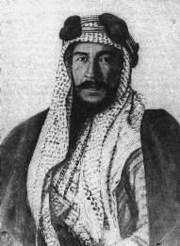 |
His Highness The 7th Ruler of Kuwait |
18 May 1896 | 28 November 1915 |
| Son of Sabah II Al-Sabah. Known as "The Great". | |||||
| 8 | Jaber II Al-Sabah (Jaber II) (1860–1917) |
 |
His Highness The 8th Ruler of Kuwait |
28 November 1915 | 2 February 1917 |
| Eldest son of Mubarak Al-Sabah. | |||||
| 9 | Salim Al-Mubarak Al-Sabah (Salim I) (1864–1921) |
 |
His Highness The 9th Ruler of Kuwait |
5 February 1917 | 22 February 1921 |
| Second son of Mubarak Al-Sabah. | |||||
| 10 | Ahmad Al-Jaber Al-Sabah (Ahmad I) (1885–1950) |
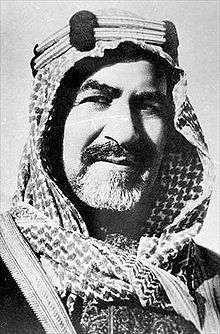 |
His Highness The 10th Ruler of Kuwait |
29 March 1921 | 29 January 1950 |
| Son of Jaber II Al-Sabah. Founder of the Kuwait Public Security Force and early stages of the Military of Kuwait.[5] | |||||
| 11 | Abdullah Al-Salim Al-Sabah (Abdullah III) (1895–1965) |
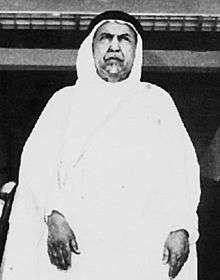 |
His Highness The 11th Ruler of Kuwait The 1st Emir of the State of Kuwait Commander-in-chief of Kuwait Military Forces. |
29 January 1950 | 24 November 1965 |
| Eldest son of Salim Al-Mubarak Al-Sabah. Political leader during the Operation Vantage, invoked Section 4 of the independence agreement to request British military intervention. Introduced the Constitution of Kuwait in 1962. Introduced the National Assembly in 1963. | |||||
| 12 | Sabah Al-Salim Al-Sabah (Sabah III) (1913–1977) |
 |
His Highness The 12th Ruler of Kuwait The 2nd Emir of the State of Kuwait Commander-in-chief of the Kuwait Military Forces. |
24 November 1965 | 31 December 1977 |
| Youngest son of Salim Al-Mubarak Al-Sabah. 1st Minister of Foreign Affairs and political leader during the Six-Day War (1967), the War of Attrition (1967–70), the 1973 Samita border skirmish and the October War (1973). | |||||
| 13 | Jaber Al-Ahmad Al-Sabah (Jaber III) (1926–2006) |
 |
His Highness The 13th Ruler of Kuwait The 3rd Emir of the State of Kuwait Commander-in-chief of the Kuwait Military Forces. |
31 December 1977 | 15 January 2006 |
| Third son of Ahmad Al-Jaber Al-Sabah. 1st Prime Minister of Kuwait and political leader during the Iran–Iraq War (1980–88), the Invasion of Kuwait (1990) and the Gulf War (1991). | |||||
| 14 | Saad Al-Abdullah Al-Salim Al-Sabah (Saad I) (1930–2008) |
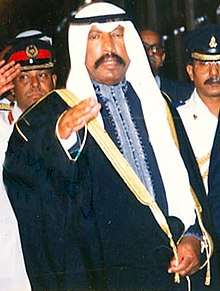 |
His Highness The 14th Ruler of Kuwait The 4th Emir of the State of Kuwait Commander-in-chief of the Kuwait Military Forces. |
15 January 2006 | 24 January 2006 |
| Eldest son of Abdullah Al-Salim Al-Sabah. 1st Minister of Interior and 2nd Minister of Defense. Defense leader during the Six Day War (1967), the War of Attrition (1967–70), the 1973 Samita border skirmish, the October War (1973) and the Iran–Iraq War (1980–88).[6] Military governor and second political leader during the Invasion of Kuwait and Gulf War. Deposed by the National Assembly and abdicated simultaneously due to illness; died on 13 May 2008. | |||||
| 15 | Sabah Al-Ahmad Al-Jaber Al-Sabah (Sabah IV) (1929–)[7][8] |
 |
His Highness The 15th Ruler of Kuwait The 5th Emir of the State of Kuwait Commander-in-chief of the Kuwait Military Forces. |
29 January 2006 | Incumbent |
| Fourth son of Ahmad Al-Jaber Al-Sabah. 2nd Minister of Foreign Affairs (1963–2003) and 2nd Minister of Interior by interim (1978). Prime Minister (2003–06).[9] Honored and decorated by the United Nations and recognized for his graceful and exemplary resolving leadership, with respect to humanitarian mission work around the Middle East and World Nations on September 9, 2014.[10] | |||||
See also
- Politics of Kuwait
- List of Prime Ministers of Kuwait
- Ministry of Foreign Affairs (Kuwait)
- Ministry of Defense (Kuwait)
- Ministry of Interior (Kuwait)
- Kuwait National Guard
References
- "Show us the money - Oil Revenues, Undisclosed Allocations and Accountability in Budgets of the GCC States" (PDF).
- Nathan J. Brown. "Mechanisms of accountability in Arab governance: The present and future of judiciaries and parliaments in the Arab world" (PDF). pp. 16–18. Archived from the original (PDF) on 2017-10-10. Retrieved 2015-01-09.
- Eran Segal. "Kuwait Parliamentary Elections: Women Making History" (PDF). Tel Aviv Notes. p. 1. Archived from the original (PDF) on 2015-01-04.
- Gazetteer of the Persian Gulf, Oman, and Central Arabia, Geographical, Volume 1, Historical Part 1, John Gordon Lorimer,1905, p1000
- Kuwait National Guard Archives, Award Medal Ceremony in presence of British Officials on February 1944 for His Highness Ahmad Al-Jaber Al-Sabah from the British Raj (British Government of India) near the Kuwait Public Security Force Directorate
- بالصور والفيديو.. ماذا قدم العرب لمصر في حرب أكتوبر (in Arabic). Retrieved 15 January 2015.
- , Honoring Kuwait 2014, Kuwait News Agency (KUNA), Sheikh Sabah Al-Ahmad Al-Jaber Al-Sabah...A Humanitarian Leader; " His Highness the Amir...His Biography & His Journey"; Retrieved December 17th, 2014
- "United Nations Secretary-General Ban Ki-moon's Statements". un.org. Retrieved 16 September 2014.
- , Honoring Kuwait 2014, Kuwait News Agency (KUNA), Sheikh Sabah Al-Ahmad Al-Jaber Al-Sabah...A Humanitarian Leader; " His Highness the Amir...His Biography & His Journey"; Retrieved December 17th, 2014
- "Secretary-General's remarks at ceremony recognizing the humanitarian leadership of His Highness Sheikh Sabah Al Ahmad Al Jaber Al Sabah, Amir of Kuwait". un.org. Retrieved 16 September 2014.
